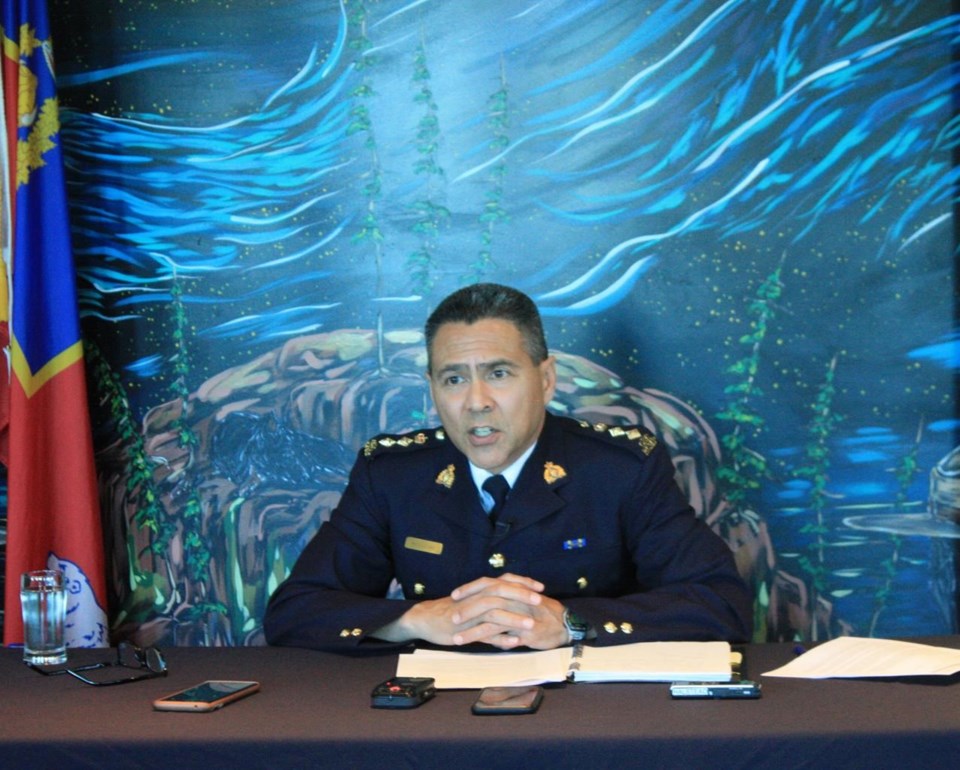YELLOWKNIFE — The head of the RCMP in the Northwest Territories says one of his top priorities is recruiting more Indigenous members and staff.
In his first media address since taking over as commanding officer of the RCMP's G division in November 2022, Chief Supt. Syd Lecky said recruitment and retention has long been a challenge for police in the territory.
"We're open for business," he said. "Recruiting in the Northwest Territories is alive and well, especially if we can get folks with the language skills to be able to help support our calls for service," he said Thursday.
Indigenous people account for about half of the territory's population. Lecky said there are currently about six Mounties in the N.W.T. who are Indigenous.
Lecky, who is a member of the Peskotomuhkati First Nation in New Brunswick, said employing Indigenous people from the N.W.T. increases the likelihood they will stay long-term.
Final planning is underway for an Indigenous pre-cadet training program where interested youth across the country attend a three-week training session at the RCMP's Depot Division in Regina.
"That would be my Number 1. If I could make one thing happen today, that would be it," he said of recruiting more Indigenous members.
"I do see when I go to the communities and people say to me, 'I want to see our people represented in the policing in our communities, of public safety in our communities,' and I'd love to give that to them."
Lecky said other policing priorities in the territory include responding to the needs of Indigenous women and girls experiencing family and intimate partner violence, strengthening relationships with Indigenous communities and improving community knowledge and understanding about local police services.
The RCMP is also working on an internal plan to enhance its response to target and disrupt the illicit drug and alcohol trade in the territory. Lecky said interdicting, intelligence gathering and training will be key parts of the plan.
"Working with our communities and our community partners is a key to how we are going to get ahead on this," he said.
"I'm confident that we're going to make strides in the right direction."
Lecky noted there has been a spike in opioid toxicity deaths in Hay River.
In January, the N.W.T.'s chief coroner, Garth Eggenberger, reported there were six such deaths in the town in 2022, largely involving crack cocaine contaminated with fentanyl or carfentanil. Comparatively, there were five opioid toxicity deaths across the territory in 2016, one in 2017, two in 2018, one in 2019, and three in both 2020 and 2021.
Lecky also reiterated a warning against vigilante justice after a group of people assaulted two men suspected of drug trafficking in Fort McPherson, and residents demonstrated outside the home of someone suspected of dealing illicit drugs in Aklavik.
"Yes the wheels of justice sometimes turn slowly, but there are rules by how we must engage and how we conduct our business," he said. "I don't encourage the public to take matters into their own hands."
This report by The Canadian Press was first published July 2, 2023.
___
This story was produced with the financial assistance of the Meta and Canadian Press News Fellowship.
Emily Blake, The Canadian Press
Note to readers: This is a corrected story. A previous version misspelled Chief Supt. Syd Lecky's last name in the second-last paragraph.



